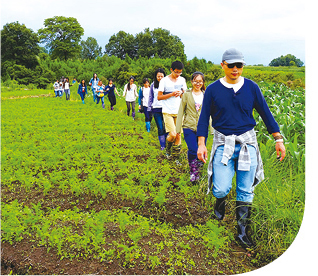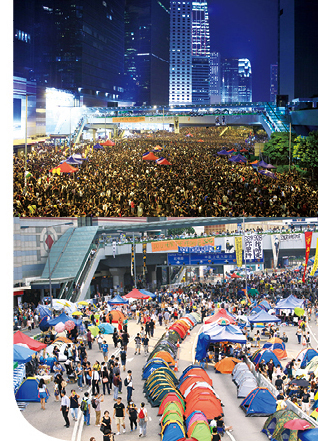Sharing Academic Knowledge
HKU academics are encouraged to share their knowledge in ways that benefit the community. This typically involves working with community partners and learning from their experiences. The University supports these activities through the Knowledge Exchange Fund and Knowledge Exchange Awards. External donors are also keen to support these kinds of exchanges.

Hina Butt
Hina Butt first heard about the Faculty of Education's efforts to promote the teaching of Chinese to non-Chinese speaking students after she failed her high-school Chinese examinations three times. She was determined to become a teacher of Chinese to people like herself, but found it impossible to succeed under the local system because it did not cater to non-native speakers.
In 2010 the Faculty's Centre for Advancement of Chinese Language Education and Research (CACLER) supported Hina to study Chinese at Beijing Normal University's campus in Zhuhai, which has a programme specifically for non-Chinese speakers, and in 2014 she graduated with a BA. The CACLER has been involved in over 20 projects to help non-Chinese speaking students like Hina, who has made a great success of the opportunities provided to her: she now teaches Chinese to non-Chinese speakers in a local school, and is studying for HKU's new two-year part-time MEd (Teaching Chinese to Non-Chinese Speaking Students).
"In secondary school I cried every day because no one was willing to help me in Chinese. My parents were very supportive and they taught me not to give up. Then the CACLER came along and what they did for me changed my life. Now I am teaching Chinese to ethnic minorities in Hong Kong and studying for a Master's degree. I tell my students, 'I will fight for you, I am the example'," she said.
Since 2006, the CACLER has organised a series of projects and after-school lessons from kindergarten to secondary school level, benefiting more than 3,500 secondary school students, 500 primary school students and 1,000 pre-primary children and their parents. It has also provided research-based professional training and development to teachers, guidance on curriculum development, books and related materials, and other resources for teachers, and held four international conferences on learning Chinese.

Architecture students in rural China
A Bird's Eye View
The Faculty of Architecture combined legwork by students with drone technology to experiment with how to create
3-D models of a remote village in China. The project aimed to integrate both physical data, such as building plans and photos, as well as soft data, such as information on the economy, culture, customs and other aspects of village life. The project was a useful learning exercise for students and was part of ongoing research to produce applicable tools for local government officials and professionals when developing new projects.

Occupy Central protests
Facilitating Political Debate
2014 has been a significant year in Hong Kong's political history. The city's future political reform moved to centre stage at the end of August, when the Standing Committee of the National People's Congress announced its decision on the framework for the next election of Hong Kong's Chief Executive. However, well before then, HKU scholars were providing platforms for people from across the political spectrum to present and discuss their differing views and opinions, and hence enhance understanding of the issues at stake, among the campus community and the general public.
In December 2013, the Centre for Comparative and Public Law launched the Design Democracy Hong Kong website, where people can learn about, design and debate different models of universal suffrage. In spring 2014 it also organised an academic roundtable on universal suffrage and nomination procedures; a seminar series on political reform; and a panel discussion by leading figures on political reform. The Centre for Chinese Law also organised a forum on central government policy towards Hong Kong that featured speakers from both Hong Kong and Mainland China.